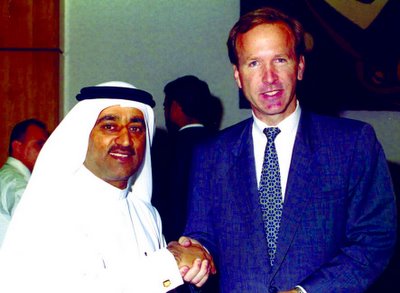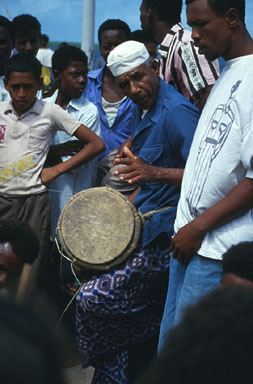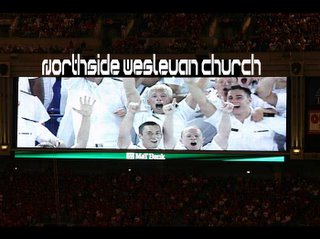Wesleyan Church Opts For "Power of Prayer" Over "Material Aid."
 Indianapolis-- In the wake of hurricane Katrina, and with denominational coffers at a yearly low, the Wesleyan Church has officially declared a halt on calls for donations to the devastated areas affected by recent storms. Despite harsh criticism from many humanitarian organizations, denominational officials have defended the recent change in policy. During a recent press conference, Larry Holman, a spokesman for the denomination, explained the departure from the traditional Wesleyan practice of charity:
Indianapolis-- In the wake of hurricane Katrina, and with denominational coffers at a yearly low, the Wesleyan Church has officially declared a halt on calls for donations to the devastated areas affected by recent storms. Despite harsh criticism from many humanitarian organizations, denominational officials have defended the recent change in policy. During a recent press conference, Larry Holman, a spokesman for the denomination, explained the departure from the traditional Wesleyan practice of charity:"It's true that in the past The Wesleyan Church has been very active in humanitarian issues, even going back to our early Methodist roots. And we're not straying from that. We're simply creating a paradym shift in the way that our concern is actually manifested. We're extremely excited about this new direction."
This new direction, according to officials, is to focus almost, if not completely, on prayer for victims affected by hurricane Katrina.
"For years," Holman continues, "we have focused almost exclusively on using material resources to alleviate human suffering. And to be sure, it has a certain level of effectiveness. However, we are trying to be a witness to this world, and how does that say anything about the power of God? It doesn't. We want to show the world that it's all about what God can do, not us. I mean, come on, if you give someone money to rebuild their house, they thank you, not God. But we want to pray, and wait for God to give them money. That way, there's no confusion. It's really all about clarity for us."
Official spokesmen for The Wesleyan Church have cited a long-range vision in their decision. According to an anonymous official, the "goal of this all is to use the money we would have wasted on humanitarian purposes to help make our churches bigger. The more people in our churches, the more people can be praying. The more people praying, the more God will pay attention and do great things. It's a very logical system, and we have high hopes that it will be a very successful one."
According to membership surveys across the denomination, there has been little if no fallout from this change in direction. In fact, a recent random survey of members from every district has indicated a 'certain level of relief.' Holman explains:
"Most of our churchgoers are tired of the guilt that gets placed on them everytime some kind of tragedy strikes. Frankly, they find it a bit depressing. This way, they don't have to feel the pressure of always giving and giving and giving. A bi-monthly prayer meeting is something that just about everyone can handle. We're all about that."
Already the effects have been felt denomination-wide. Membership has increased by 15%, and many churches are able to invest extra cash in remodeling, building projects, and multi-media upgrades.
"In the end, we think this is the right direction. After all, you can't quantify God or what God does. But you can quantify extra cash. And when it comes time to submit year-end reports, that's something special.










